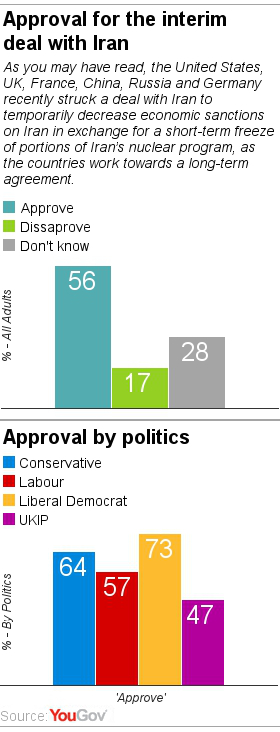56% of the public approve of temporarily lifting sanctions on Iran in exchange for suspending part of their nuclear programme
The five permanent members of the UN Security Council plus Germany (P5+1) and Iran have agreed to lift trading sanctions worth £4.3bn in return for halting, and “in some respects roll[ing] back”, Iran’s nuclear programme.
Israel’s Prime Minister Benjamin Netanyahu has called the deal a “historic mistake”, referring to doubts over the sincerity of Iran’s promise to slow down Uranium enrichment programmes. William Hague expressed understanding: Iran “has a history of not revealing the truth about its nuclear programme”, he said.
56% of the British public approve of the interim deal. Just 17% of the public disapprove and 28% do not know.
When British officials declined an invite to Iranian leader Hassan Rouhani’s inauguration in August, the Labour party criticised the foreign office’s decision as a “missed opportunity”.
Their voters are less supportive of diplomacy with Iran than others, however, as 57% approve of the lifting of sanctions compared to 64% of Conservatives and 73% of Liberal Democrats. UKIP supporters were much less supportive than other groups: only 47% of UKIP supporters approve of the deal, and over a third (35%) oppose it.
Iran’s former president Mahmoud Ahmadinejad had reportedly threatened to “wipe Israel off the face of the earth”, stoking tension between the Islamic and Jewish states. His successor, Rouhani, has publicly taken a more conciliatory approach, avoiding aggressive language and famously wishing Jews a happy Rosh Hashanah earlier this year.
But the P5+1 deal with Iran has nevertheless worried Israel, whose prime minister has made it his mission to protect his nation from Iran.
Image: Getty







